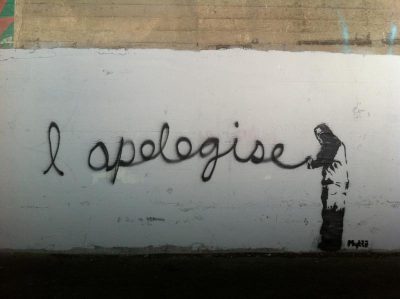
For me, apologizing comes too easily and too frequently. I often apologize for things that are not my fault, or out of my control. I apologize when people take their rage out on me, I apologize when I am the one inconvenienced—hell, I even apologized to the guy who accidentally hit me in the face at the gym on Tuesday. Apologizing has become an uncontrollable reflex, a response triggered by my low confidence, self doubt, and subconscious desire to beg pardon just for existing.
I believe the uncontrollable urge to apologize stems from the same place as the inability to say “no” or ask for the things you deserve. We apologize unnecessarily because we feel guilty and fearful of inconveniencing or upsetting others, or because we don’t believe we deserve better. We refuse to say “no” because we think we should prioritize the needs of others before ourselves, even when their needs inconvenience or conflict with our own, and we cannot will ourselves to ask for things because we believe we are unworthy of receiving them. While these three scenarios may seem unrelated, they are not. They’re all indicative of a reality in which we don’t believe we are worthy of taking up the same amount of space as our peers. I apologize not because I am sorry for my actions; I apologize because I am sorry for my existence.
I am not naive enough to presume that this perception of reality or lack of self confidence can be changed overnight. Many of us have been told repeatedly throughout our lives that we should feel bad or guilty for wanting the privileges and respect other people have. My entire life I have struggled with low self esteem. I have felt unintelligent, ugly, and worthless, and I used to believe that by apologizing profusely that people would be less angry with me for existing. Even today I am genuinely surprised when someone apologizes to me, or says I have no reason to feel sorry, and that’s because of these feelings I have internalized. But what I know now is that constantly apologizing threatens to undercut our opportunities for success. When we repeatedly apologize we put ourselves in a position of weakness, we publicly admit that we do believe in our own worth, and that kind of thinking can be contagious. We send out the message that we are unsure in our abilities, insincere, or too pessimistic and stubborn to get out of our own heads.
Beyond that, when we apologize for things we haven’t done, we let those responsible off the hook. When we make up excuses for other people’s poor actions we are enabling them to continue their destructive or abusive behavior. The reality is that people don’t actually treat others the way they want to be treated; they treat others however they’re allowed to treat them.
I am personally tired of taking the backseat in my own life because I am afraid of upsetting others, or because I have a voice inside my head that tells me I deserve less. I am tired of being the punching bag for people who do not know a better way to express their anger, and I am tired of excusing unjustifiable treatment from people who need to grow up and learn to recognize their own culpability. I don’t want to be the person who apologizes for being bumped into. I don’t want to be the person who says he’s done using a machine at the gym simply because he’s afraid of telling another guy that he still needs it. If I am going to apologize, I want it to be because I have done something wrong or have made a mistake. If I say yes to something, I want it to to be because I want to actually do it, and not because I am afraid to inconvenience others. And if I don’t ask for something, I want it to be because I don’t need it and not because I am afraid to take up the space I deserve as much as anyone else.

Hi! I’ve just discovered your blog recently and I’m so glad I did. I’ve looked through a couple of your posts and am loving it! I particularly adore this post. As someone who apologizes too often and then also apologizes to herself for the resulting consequences, this post was a much-needed read. Thank you for the laughs you provide and for the commentary you articulate on social issues!
LikeLike
Thank you so much for your comment! I’m glad you can relate- hopefully we can both apologize less often in the future 😀
LikeLike